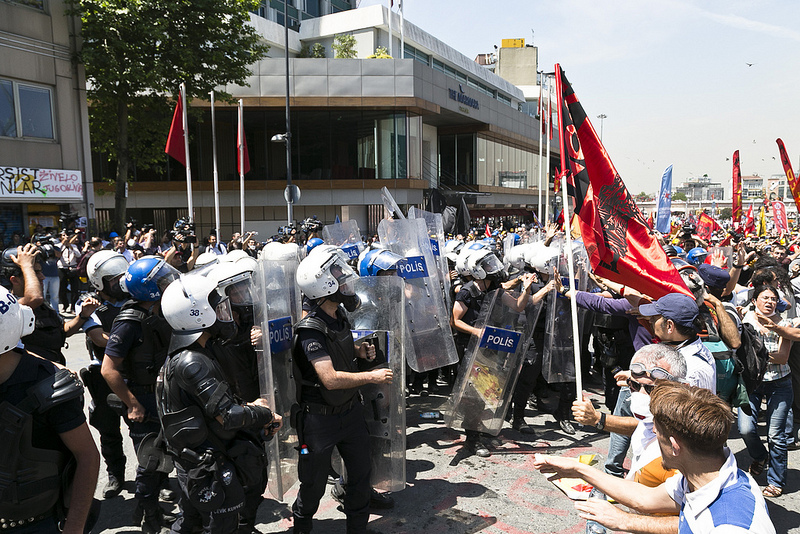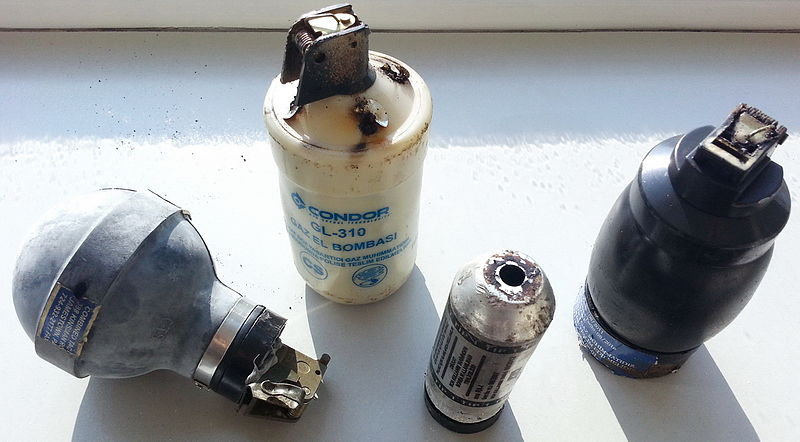Berkin Elvan died after 269 days in a coma. He was killed by a teargas canister shot by Turkish riot police. He was 15 years old, still a child. But for Prime Minister Erdogan, the boy was a terrorist. Calling him a terrorist was an easy way out, a way to avoid giving condolences or apologizing for the crime police committed, acting on his orders. Maybe in Erdogan’s “parallel state” Berkin Elvan was a terrorist. But for others he was just a kid. He will be remembered by his family, friends, and hundreds of thousands of Turks who marched in peace and support on the day when young Berkin was buried not as a terrorist, but as a kid out buying bread.
The park
When the Prime Minister ordered the demolition of a park in central Istanbul, a little less than a year ago, he did not know what was to come. When country-wide protests broke out, he dismissed them as part of a plot (orchestrated by the “Interest lobby”) to overthrow him and discredit the ruling party. He was quick to blame everything on “external” factors and to call the protesters all sorts of names. Everyone, everywhere was responsible but the Prime Minister himself. His reaction, and his divisive rhetoric, polarized the country.
Erdogan did not recognize the Gezi park protests as anything more than just people’s anger at a demolition of few trees. He failed to see the bigger picture — that this was an accumulation of grievances against his government. Everyone who was on the street last summer was a hooligan, part of the riffraff, or a destroyer of what this government has built over the past 11 years.
Over 8000 people were injured, 5,300 arrested and 11 killed last summer. The excessive use of force by Turkish riot police, the piercing smoke of tear gas canisters (and the canisters themselves), and the painful blows of the rubber bullets, resulted in 14 people losing their eyes.
Winter is coming
One of the popular slogans shared during the summer protests was “Tayyip, winter is coming” referring to a widely popular TV series “The Game of Thrones.” Little did the authors of this slogan know that winter indeed was coming and that it would bring serious challenges to the ruling government. From December 2013 to the present, the ruling Justice and Development Party is entangled in a corruption scandal. The sons of three cabinet ministers, a construction tycoon, and a mayor from the AKP party implicated in deals were arrested in Istanbul and Ankara. Several phone conversations including calls between the Prime Minister and his son [tr] — concerning the retrieval of $1 billion of accumulated cash out of the family house — were released and shared widely (the PM and his son insist the recording is a fake and is another attempt by the “parallel state” to overthrow the honest AKP.) Other recordings included Erdogan calling the executive at local news network HaberTurk and asking him to censor the views of an opposition leader and a critical story on health care reform — the reporters and editor in charge of the story were soon fired. To Erdogan this is normal- “we have to teach [the media],” he said in a press conference.
In another call the Prime Minister asked his Justice Minister, to take care of a case against Aydin Dogan, a media boss, facing tax evasion charges. In response, the Minister said it was going to be impossible to influence the course of the case, due to the background of the presiding judge as he was from the Alevi community (a religious minority group in Turkey that is often at odds with the ruling party). Admitting to this phone call as well, Erdogan said it was natural that he asked for this. “Anything for the country and the nation,” he added.
Following this statement, it was no surprise that in yet another move to stifle freedom of expression in Turkey, Erdogan blocked to Twitter on March 20. “We will eradicate it!” exclaimed Erdogan at a campaign rally in Bursa. Twelve hours later, just around midnight, Internet users could no longer access Twitter. The government made good on recent promises to block access to major social media sites if it became necessary. While it seems easier to influence his own folks like the Ministers or the heads of news channels over a phone call, dealing with international platforms as Twitter isn’t as simple. And so in order to eradicate this “menace to society” as Erdogan called the social platforms during the summer protests, four court orders were issued meaning every Internet provider, including the GSM operators must implement the ban. As Erdogan fired at Twitter, he added, he didn’t care what the international community would think.
And Erdogan was unapologetic when it came to the death of the 15-year-old Berkin Elvan. The day of his funeral, protests erupted with police resorting to violence yet again. Protesters in 15 cities joined the clashes with the police. The Prime Minister chose to keep his silence on the day of the funeral while President Gul and other officials were quick to offer sympathy to Elvan’s family. Former EU Minister Egemen Bagis called the protesters “necrophiliacs” in a tweet that was removed shortly after it was posted.
Erdogan’s silence over the death of a young boy was only broken at a campaign rally in Gaziantep, where the Prime Minister instead of giving his condolences called the young boy a terrorist. He also made the crowds boo the mother of the boy — Gulsum Elvan, who said “My son’s killer is the prime minister!” Carrying a slingshot with “shooting marbles” was a weapon and meant that Berkin was a member of a terrorist group.
Attempting to seek justice for Elvan’s death, Taksim Solidarity group — the organizing community behind the Gezi Park protests — launched a crowd-funding campaign online to dedicate a full-page obituary in the New York Times.
Fundamental rights at stake
There are more journalists in prison in Turkey than in China. As protests of this past year showed, the country’s record of dealing with protesters is bleak. The two controversial laws recently passed by the Parliament — on the Supreme Board of Judges and Prosecutors and on the regulation of the Internet — demonstrate the government’s tightening grip over the judiciary and online content. And there is growing concern over Internet surveillance and the potential impact this could have on freedom of expression in Turkey, which is already in a fragile state.
When Berkin Elvan stepped out of his family’s apartment on June 13, he wasn’t fighting for his right to freedom of expression. But nine months later, when he lost his life, the people who mourned together with his family, marched in the streets, and faced police resistance were fighting for their right to assembly and expression. National elections in Turkey will be held on March 30. Somehow, while letting mourners suffocate from tear gas and ignoring the calls of protesters, Tayyip Erdogan is calling for democratic elections in a democratic state. Yet Turkey is nowhere near the promised land of liberal democracy.






4 comments